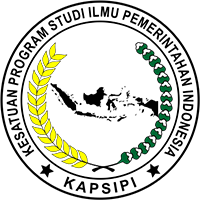Adaptive Governance Model
Development of Green Villages Based on the Policy of Siak Green Regency
DOI:
https://doi.org/10.35967/njip.v24i1.870Keywords:
Village, Green Governance, Adaptive Governance, Green Village, Green Siak PolicyAbstract
Green Villages are a strategic approach to promoting sustainable development, especially in tropical peat areas. This initiative is part of the Green Regency Siak policy in response to the importance of community-based environmental governance in achieving the Sustainable Development Goals (SDGs). However, in-depth studies related to the adaptive governance model in this policy are still limited, both from a theoretical and empirical perspective. This study uses a descriptive qualitative approach with case studies in several villages in Siak Regency that have implemented Green Villages. Data were collected through in-depth interviews, document studies, and participatory observations, and then analyzed thematically using the theoretical framework of adaptive governance. The results of this study found that the adaptive governance model in Siak Regency consists of four main dimensions, namely, multi-actor participation, institutional flexibility, integration of local knowledge, and response to environmental dynamics. Its implementation includes village regulations, restoration programs, and ecological fiscal incentives. This study concludes that the success of Green Villages is largely determined by local adaptive capacity and cross-sectoral support. A collaborative and social learning-based governance framework is needed in dealing with the complexity of sustainable peat ecosystem management
Downloads
References
Angeler, D. G., Fried-Petersen, H. B., Allen, C. R., Garmestani, A., Twidwell, D., Chuang, W.-C., Donovan, V. M., Eason, T., Roberts, C. P., Sundstrom, S. M., & Wonkka, C. L. (2019). Adaptive capacity in ecosystems (pp. 1–24). https://doi.org/10.1016/bs.aecr.2019.02.001
Anto, Salimang, & Nuryanti Mustari. (2024). Dynamics of Apparatus Performance in Achieving Accountability in Village Services. Jurnal Ilmu Pemerintahan, 23(1), 135–144. https://doi.org/10.35967/njip.v23i1.702
Armitage, D. R., Plummer, R., Berkes, F., Arthur, R. I., Charles, A. T., Davidson-Hunt, I. J., Diduck, A. P., Doubleday, N. C., Johnson, D. S., Marschke, M., McConney, P., Pinkerton, E. W., & Wollenberg, E. K. (2009). Adaptive co-management for social–ecological complexity. Frontiers in Ecology and the Environment, 7(2), 95–102. https://doi.org/10.1890/070089
Bettini, Y., Brown, R. R., & de Haan, F. J. (2015). Exploring institutional adaptive capacity in practice: examining water governance adaptation in Australia. Ecology and Society, 20(1), art47. https://doi.org/10.5751/ES-07291-200147
Burchill, S. (2005). The National Interest in International Relations Theory (1st ed.). Palgrave Macmillan London. https://doi.org/10.1057/9780230005778
Carter, N., Bryant-Lukosius, D., DiCenso, A., Blythe, J., & Neville, A. J. (2014). The Use of Triangulation in Qualitative Research. Oncology Nursing Forum, 41(5), 545–547. https://doi.org/10.1188/14.ONF.545-547
Cosens, B., Ruhl, J. B., Soininen, N., Gunderson, L., Belinskij, A., Blenckner, T., Camacho, A. E., Chaffin, B. C., Craig, R. K., Doremus, H., Glicksman, R., Heiskanen, A.-S., Larson, R., & Similä, J. (2021). Governing complexity: Integrating science, governance, and law to manage accelerating change in the globalized commons. Proceedings of the National Academy of Sciences, 118(36). https://doi.org/10.1073/pnas.2102798118
DeJonckheere, M., & Vaughn, L. M. (2019). Semistructured interviewing in primary care research: a balance of relationship and rigour. Family Medicine and Community Health, 7(2), e000057. https://doi.org/10.1136/fmch-2018-000057
Dorsch, M. J., & Flachsland, C. (2017). A Polycentric Approach to Global Climate Governance. Global Environmental Politics, 17(2), 45–64. https://doi.org/10.1162/GLEP_a_00400
Febrina, R., Marta, A., Muhammad Amin, R., Hadi, S., Ferlan, M., & Essio Mento, M. (2025). Penguatan Tata Kelola Badan Usaha Milik Desa (BUMDes) Berbasis Kampung Hijau. Abdimas Indonesian Journal, 5(1), 313–324. https://doi.org/10.59525/aij.v5i1.624
Febrina, R., et al. (2025). Penguatan Tata Kelola Badan Usaha Milik Desa (BUMDes) Berbasis Kampung Hijau. Abdimas Indonesian Journal, 5(1), 313–324. https://doi.org/10.59525/aij.v5i1.624
Juhola. (2014). Sustainable Cities and Military Installations (I. Linkov, Ed.). Springer Netherlands. https://doi.org/10.1007/978-94-007-7161-1
Lailia, A. N. (2014). Gerakan Masyarakat dalam Pelestarian Lingkungan Hidup (Studi Tentang Upaya Menciptakan Kampung Hijau di Kelurahan Gundih Surabaya). In Jurnal Politik Muda (Vol. 3, Issue 3). www.republika.co.id
Maulida, K. (2021). Forum Wahana Lingkungan Hidup Indonesia (Walhi) Lampung dalam Kasus Revisi Perda RZWP3K Berdasarkan Perspektif Advocacy Coalition Framework. Nakhoda: Jurnal Ilmu Pemerintahan, 20(02). https://doi.org/10.35967/njip.v20i2.157
Moser, A., & Korstjens, I. (2018). Series: Practical guidance to qualitative research. Part 3: Sampling, data collection and analysis. European Journal of General Practice, 24(1), 9–18. https://doi.org/10.1080/13814788.2017.1375091
Niam, Rumahlewang, E., Umiyati, H., Putu, N., Dewi, S., Atiningsih, S., Haryati, T., Magfiroh, I. S., Raden, I., Anggraini, R. P., Mamengko, S., Fathin, M., Septian, R., Mola, A. A., & Syaifudin, F. W. (2024). Metode Penelitian Kualitatif. Penerbit Widna Media Utama.
Paauw, M., Scown, M., Triyanti, A., Du, H., & Garmestani, A. (2022). Adaptive Governance of River Deltas Under Accelerating Environmental Change. Utrecht Law Review, 18(2), 30–50. https://doi.org/10.36633/ulr.803
Plummer, R., & Armitage, D. (2010). Integrating Perspectives on Adaptive Capacity and Environmental Governance (pp. 1–19). https://doi.org/10.1007/978-3-642-12194-4_1
Rahmawati, H., Pribadi, R., & Santoso, A. (2024). Strategy Rehabilitation and Management of Mangrove Based on SWOT Analysis in Betahwalang Village Bonang, Bonang Sub-District, Demak Regency, Central Java. Journal of Marine Research, 13(2), 239–247. https://doi.org/10.14710/jmr.v13i2.26959
Ramdani, S. A., & Kharisma, B. (2025). Village Fund And Village Development In West Java Province. https://doi.org/10.21203/rs.3.rs-5962094/v1
Rendra Oxtora, L. A. (2024). DLHK Kalbar evaluasi perhutanan sosial di Kapuas Hulu. Antaranews. https://kalbar.antaranews.com/berita/580254/dlhk-kalbar-evaluasi-perhutanan-sosial-di-kapuas-hulu
Siedenburg, J. R. (n.d.). (2022). Working Paper Number 166 Local Knowledge and Natural Resource Management in a Peasant Farming Community Facing Rapid Change: A Critical Examination. https://doi.org/10.48550/arXiv.2204.04396
Sisca Indriyani, Sunarto Sunarto, & Muhammad Indrawan. (2024). Evaluasi Pelaksanaan Program Kampung Iklim Berbasis Partisipasi Masyarakat (Studi Kasus Di Rw 09, Kelurahan Pucangsawit). Jurnal Lingkungan Binaan Indonesia, 13(3), 109–124. https://doi.org/10.32315/jlbi.v13i3.366
Subhan, M., Meiwanda, G., & Arya Putri, R. (2022). Analisis Peran Stakeholder dalam Program Siak Hijau di Kabupaten Siak. Jurnal Ilmiah Wahana Pendidikan, 8(22), 439–454. https://doi.org/10.5281/zenodo.7350216
Van Assche, K., Valentinov, V., & Verschraegen, G. (2022). Adaptive governance: learning from what organizations do and managing the role they play. Kybernetes, 51(5), 1738–1758. https://doi.org/10.1108/K-11-2020-0759
Warouw, F. F., Waty, R. R., Mayasari, Y., Syam, Abd. R., & Muksin, I. (2023). Local Government Adaptation Strategies in Facing Climate Change: An Innovative Framework. VISIONER: Jurnal Pemerintahan Daerah Di Indonesia, 15(2), 29–41. https://doi.org/10.54783/jv.v15i2.863
Wicaksono, & Agung. (2019). Kolaborasi Multi Aktor dalam Program Restorasi Gambut di Provinsi Riau. Jurnal Administrasi Dan Kebijakan Publik, 4(2), 99–113. https://doi.org/10.25077/jakp.4.2.111-125.2019
Downloads
Published
How to Cite
Issue
Section
License
Copyright (c) 2025 Authors

This work is licensed under a Creative Commons Attribution-NonCommercial-ShareAlike 4.0 International License.





